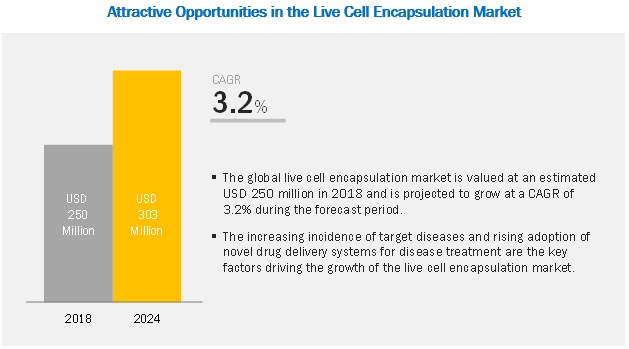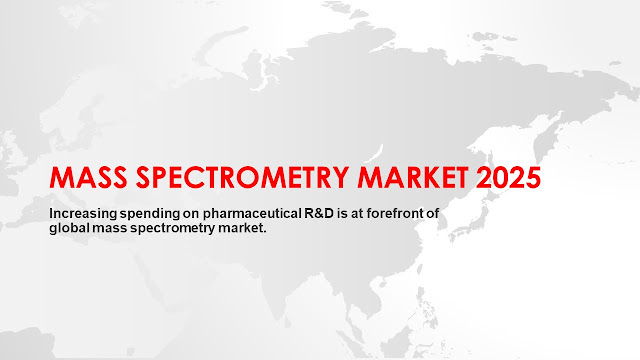Live Cell Encapsulation Market: Emerging Growth Opportunities
This report aims to provide detailed insights into the global live
cell encapsulation market. It provides valuable information on the type,
procedure, application, and region in the market. Furthermore, the information
for these segments, by region, is also presented in this report. Leading
players in the market are profiled to study their product offerings and
understand the strategies undertaken by them to be competitive in this market.
Don't miss out on business opportunities in Live Cell
Encapsulation Market
Revenue Growth Analysis:
The global Cell Encapsulation Industry is projected to reach USD 303 million by
2024 from USD 250 million in
2018, at a CAGR of 3.2%.
Download PDF Brochure:
https://www.marketsandmarkets.com/pdfdownloadNew.asp?id=218019375
Key Factors Driving Market Growth:
The major factors driving the growth of the Live Cell Encapsulation Industry
are the rising public awareness related to the clinical role of encapsulated
cells in disease management, increasing public-private investments to support
product development, and the rising adoption of novel drug delivery systems for
disease treatment.
Simple dripping segment is expected to account for the largest share of the
Live Cell Encapsulation Market, by manufacturing technique, in 2018
Based on manufacturing technique, the Live Cell Encapsulation Industry is
segmented into . The instruments segment is expected to account for the largest
share of the Live Cell Encapsulation Industry in 2019. The increasing adoption
due to the procedural benefits (such as simple process, product
biocompatibility, and low particle size distribution) are the major factors
driving the growth of this market segment.
Alginate polymers segment estimated to be the fastest-growing polymer type
segment during the forecast period
Based on polymer type, the Live Cell Encapsulation Industry is segmented into
alginate, HEMA-MMA (hydroxyethyl methacrylate-methyl methacrylate), chitosan,
siliceous encapsulates, cellulose sulfate, PAN-PVC [poly (acrylonitrile vinyl
chloride)], and other polymers. The alginate segment is expected to grow at the
highest CAGR during the forecast period primarily due to the procedural
benefits such as uniform cell structures and high mechanical stability.
Drug delivery to account for the largest share of the Live Cell
Encapsulation Market, by application, in 2018
Based on end user, the Live Cell Encapsulation Industry is segmented into drug
delivery, regenerative medicine, cell transplantation, probiotics, and
research. Drug delivery are estimated to be the largest application of live
cell encapsulation, and this trend is expected to continue during the forecast
period. The large share of this application segment can be attributed to the
ongoing technological advancements in the field of cell encapsulation and
increased product affordability, and usage of biocompatible immobilization or
isolation systems.
Request Sample Report:
https://www.marketsandmarkets.com/requestsampleNew.asp?id=218019375
North America to
dominate the Live Cell Encapsulation Market during the forecast period
The Live Cell Encapsulation Industry is segmented into five major regions,
namely, North America, Europe, the Asia Pacific, Latin America, and
the Middle East and Africa. North America is
estimated to be the largest regional market for live cell encapsulation in 2019
majorly due to the increasing clinical data for the efficacy of the cell
encapsulation technique and the rising adoption of cell encapsulation
techniques among medical professionals.
Key Players:
The major players operating in the Live Cell Encapsulation Industry are
BioTime, Inc. (US), Reed Pacific Pty Ltd. (Australia), Viacyte, Inc. (US), Neurotech
Pharmaceuticals, Inc. (US), and Living Cell Technologies Ltd. (Australia) were the
top five players in the global Live Cell Encapsulation Industry.
Other prominent players operating in this market include Merck KGAA (Germany), Sigilon
Therapeutics, Inc. (US), Encapsys, LLC (US), Evonik Industries (Germany), Lycored (Israel), MiKroCaps
(Slovenia),
BÜCHI Labortechnik AG (Germany),
Blacktrace Holdings Ltd (UK), Sernova Corporation (Canada), and Balchem Corporation (US),
among others.




Comments
Post a Comment